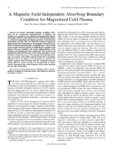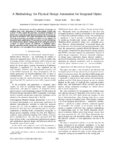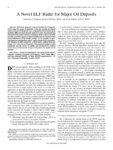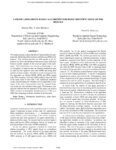|
|
Creator | Title | Description | Subject | Date |
| 76 |
 |
Simpson, Jamesina J. | A magnetic field-independent absorbing boundary condition for magnetized cold plasma | An effective absorbing boundary condition (ABC) based on the second-order approximations of Engquist and Majda's wave equations is presented for terminating three-dimensional finite-difference time-domain (FDTD) models employing the E-J collocated magnetized cold plasma algorithm. Numerical tests de... | | 2011-01-01 |
| 77 |
 |
Stevens, Kenneth | A mathematical approach to a low power FFT architecture | Architecture and circuit design are the two most effective means of reducing power in CMOS VLSI. Mathematical manipulations have been applied to create a power efficient architecture of an FFT. This architecture has been implemented in asynchronous circuit technology that achieves significant powe... | | 1998 |
| 78 |
 |
Mathews, V. John; Clark, Edward B. | A mathematical basis for the application of the modified geometric method to maximum frequency estimation | Abstract-The application of ultrasound in assessing the fetal cardiovascular system often requires the accurate estimation of maximum blood flow velocity waveforms using Doppler measurements. The modified geometric method estimates the maximum Doppler frequency as the frequency at which the vertica... | | 2004 |
| 79 |
 |
Bennion, Scott Thomas | A method of solution for hydrodynamics and radiation diffusion as a multi-material problem in one dimension | | Multi-material problem | 1971 |
| 80 |
 |
Blair, Steven | A methodology for physical design automation for integrated optics | Advancements in silicon photonics technology are enabling large scale integration of electro-optical circuits and systems. To fully exploit this potential, automated techniques for design space exploration and physical synthesis for integrated optics must be developed. This paper investigates how co... | | 2012-01-01 |
| 81 |
 |
Mathews, V. John | A minimax approach for the joint design of acoustic crosstalk cancellation filters | Abstract-This paper presents a method for jointly designing immersive audio rendering filters for a single listener using loudspeakers. The filters for crosstalk cancellation are assumed to have finite impulse responses and are designed using the minimax criterion. In addition to the traditional At... | | 2007 |
| 82 |
 |
Weinstein, David | A morphing algorithm for generating near optimal grids: applications in computational medicine | We apply morphing to t h e problem of generating the initial mesh for finite element simulations. This algorithm reduces mesh adaptation time by integrating physical and geometric constraints to provide a near optimal initial mesh. We apply this method to large-scale bioelectric field problems invol... | Morphing algorithm; Bioelectric field problems | 1994 |
| 83 |
 |
Subrahmanyam, P.A. | A new approach to specifying and handling exceptions | An operation generally exhibits different patterns of behavior over different parts of its domain. Depending upon the context, such behavior may either be conceived of as "normal" or as an "exception." Thus, the behavior of an operation Is quite naturally characterized by the set of partial operatio... | Computer operations; Exceptions; Exception handling | 1980 |
| 84 |
 |
Bruderlin, Beat | A new approach to tolerance analysis | Tolerance analysis is seen as part of a more general problem, namely handling data with uncertainty. Uncertain geometric data arises when interpreting measured data, but also in solid modeling where floating point approximations are common, when representing design tolerances, or when dealing with l... | Tolerance analysis | 1994 |
| 85 |
 |
Mathews, V. John | A new carrier frequency estimator for modem signals | ABSTRACT A novel carrier frequency estimation scheme for a relatively broad class of voiceband data signals (modem signals) is presented in this paper. The class of signals being studied includes different types of phase-shift-keyed (PSK) and frequency-shift-keyed (FSK) signals. The frequency estim... | | 1988 |
| 86 |
 |
Kirby, Robert Michael II; Johnson, Christopher R. | A new family of variational-form-based regularizers for reconstructing epicardial potentials from body-surface mapping | We propose a new family of regularizers for the inverse ECG problem, using a variational principle that underlies finite element approximation methods. As an alternative to traditional Tikhonov regularizers, the variational formulation has several advantages: 1)it enables a simple construction of ... | | 2010 |
| 87 |
 |
Cohen, Elaine | A new local basis for designing with tensioned splines | Recently there has been a great deal of interest in the use of "tension" parameters to augment control mesh vertices as design handles for piecewise polynomials. A particular local cubic basis called p-splines, which has been termed a "generalization of B-splines", has been proposed as an appropriat... | Tensioned splines | 1985 |
| 88 |
 |
Mathews, V. John | A new model of perceptual threshold functions for application in image compression systems | This paper discusses the development of a perceptual threshold model for the human visual system. The perceptual threshold functions describe the levels of distortions present at each location in an image that human observers can not detect. Models of perceptual threshold functions are useful in ima... | | 1995 |
| 89 |
 |
Sikorski, Kris | A note on optimal algorithms for fixed points | We present a constructive lemma that we believe will make possible the design of nearly optimal 0(dlog | ) cost algorithms for computing eresidual approximations to the fixed points of d-dimensional nonexpansive mappings with respect to the infinity norm. This lemma is a generalization of a two-... | Fixed points; Constructive lemma | 2009 |
| 90 |
 |
Lyche, Tom | A note on the Oslo algorithm | The Oslo algorithm is a recursive method for updating the B-spline representation of a curve or tensor product surface when extra knots are added. In the present note the derivation of this method is simplified. | Oslo algorithm; B-spline; Curve product surface; Tensor product surface | 1987 |
| 91 |
 |
Simpson, Jamesina J. | A novel ELF radar for major oil deposits | This letter proposes a novel extremely low frequency (ELF) radar for major oil deposits. Using our recently developed whole-Earth electromagnetic wave propagation model based upon the finite-difference time-domain method, we have determined that detection of the radial (vertical) component of the sc... | | 2006-01-01 |
| 92 |
 |
Sloan, Peter-Pike | A painterly approach to human skin | Rendering convincing human figures is one of the unsolved goals of computer graphics. Previous work has concentrated on modeling physics of human skin. We have taken a different approach. We are exploring techniques used by artists, specifically artists who paint air-brushed portraits. Our goal is t... | Human skin | 1999 |
| 93 |
 |
Parke, Frederic Ira | A parametric model for human faces | This report presents a computer model for the representation of human faces. This three-dimensional, parametric model produces shaded facial images. The face, constructed of polygonal surfaces, is manipulated through the use of parameters which control interpolation, translation, rotation and scalin... | Parametric model; Human face | 1975 |
| 94 |
 |
Gopalakrishnan, Ganesh | A partial order reduction algorithm without the Proviso | This paper presents a partial order reduction algorithm, called Two phase, that preserves stutter free LTL properties. Two phase dramatically reduces the number of states visited compared to previous partial order reduction algorithms on most practical protocols. The reason can be traced to a step o... | Order reduction algorithm; Proviso step | 1998 |
| 95 |
 |
Brunvand, Erik L. | A partial scan methodology for testing self-timed circuits | This paper presents a partial scan method for testing control sections of macromodule based self-timed circuits for stuck-at faults. In comparison with other proposed test methods for self-timed circuits, this technique offers better fault coverage than methods using self-checking techniques, and ... | | 1995 |
| 96 |
 |
Brunvand, Erik L. | A partial scan methodology for testing self-timed circuits | This paper presents a partial scan method for testing control sections of macromodule based self-timed circuits for stuck-at faults. In comparison with other proposed test methods for self-timed circuits, this technique offers better fault coverage than methods using self-checking techniques, and re... | Self-timed circuits; Testing | 1995 |
| 97 |
 |
McDirmid, Sean; Hsieh, Wilson C. | A path-precise analysis for property synthesis | Recent systems such as SLAM, Metal, and ESP help programmers by automating reasoning about the correctness of temporal program properties. This paper presents a technique called property synthesis, which can be viewed as the inverse of property checking. We show that the code for some program pro... | Property synthesis; Property codes | 2003-12-01 |
| 98 |
 |
Thompson, Cynthia A. | A personalized system for conversational recommendations | Increased computing power and theWeb have made information widely accessible. In turn, this has encouraged the development of recommendation systems that help users find items of interest, such as books or restaurants. Such systems are more useful when they personalize themselves to each user?s p... | Adaptive Place Advisor; Recommendation systems | 2002-06-26 |
| 99 |
 |
Mathews, V. John | A phase likelihood-based algorithm for blind identification of PSK signals | This paper presents a phase likelihood-based method for automatically identifying different phase-shift keying (PSK) modulations. This method identifies the PSK signals as the hypothesis for which the likelihood function of phase difference between nearby samples of the received signal is the maximu... | | 2014-01-01 |
| 100 |
 |
Regehr, John | A practical logic framework for verifying safety properties of executables | We present a novel program logic, Lf , which is designed on top of a Hoare logic, but is simpler, more flexible and more scalable. Based on Lf , we develop a framework for automatically verifying safety properties of executables. It utilizes a whole-program interprocedural abstract interpretation to... | | 2011-01-01 |

























